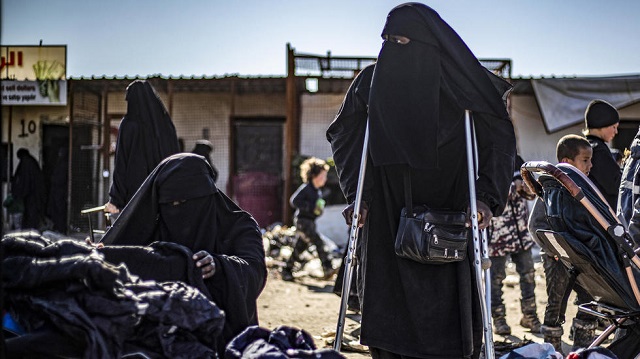
Al-Hol Camp, Syria | AFP | In an overcrowded desert camp for families linked to the Islamic State group in northeastern Syria, a French woman begged for another chance so she and her children could go home.
In the same settlement, two other French women were more tepid about the prospect of repatriation, with one saying she feared being separated from her child.
In the squalid camp of Al-Hol, the question of return has sparked a divide among the French wives of IS fighters.
“We’d like the French government to give us the chance to make it up to them,” 30-year-old Umm Mohammad told AFP in French.
“I think it’s better they repatriate us… We’ll be judged in France,” said the mother of four from Paris, dressed in a black robe and face veil.
After years of fighting IS, Syria’s Kurds hold 4,000 women and 8,000 children from families linked to the extremist organisation, mostly in Al-Hol.
Inside the camp, a veiled woman pushed a child in a pram, the bottom of her black robe caked in dry mud.
Two boys in jackets and rubber boots dragged a cart over a dirt field beyond rows of white tents, a little girl in a pink coat running alongside.
Umm Mohammad said that among her compatriots in Al-Hol’s section for foreigners, “a huge amount want to go home”.
“There’s another half who don’t want to go back, but that’s their problem,” said the widow, who says her French husband was killed in Hajin, once one of the last bastions of the IS “caliphate”.
France has so far been reluctant to repatriate its nationals, allowing just a handful of children back on a case-by-case basis.
But in an apparent U-turn last week, Justice Minister Nicole Belloubet said she saw “no other solution” but to bring back jihadists.
– ‘Never killed’ –
Kurdish-led forces expelled IS from its last patch of territory in eastern Syria in March last year.
The jihadists stand accused of a wide range of crimes during their failed five-year experiment in statehood in parts of Syria and neighbouring Iraq.
But Umm Mohammad claimed she “did nothing at all” while living under IS.
“I never killed anyone,” she said.
“We’re really tired. Our children, we’d like them to go back to school.”
In the camp’s makeshift market, women dressed in black examined piles of colourful clothes laid out on blankets.
A woman carried a tray of white eggs, followed by another balancing a plastic crate of oranges on her head.
Away from the bustle, another French woman lamented the living conditions.
“I don’t want to stay in this camp,” said 23-year-old Nour, her brown eyes barely visible through the slit of her face veil.
“It’s very difficult. We live in tents. It’s cold. People are sick.”
At least 371 children died in Al-Hol last year, the Kurdish Red Crescent has said, mainly from malnutrition, poor healthcare for newborns and hypothermia.
The Kurdish authorities have warned that conditions could deteriorate further after the UN Security Council on January 10 voted to restrict cross-border aid.
The Yaroubiya crossing on the Iraqi border was a key entry point for UN-funded medical aid reaching the area, including Al-Hol.
– ‘France doesn’t want us’ –
Nour, who said she was from the city of Montpellier in southern France, said she wanted to resume a normal life.
“I want to live normally again — with my hijab, my children, my Islam,” she said.
But she insisted she did not want to be separated from her children.
“If they’re going to separate us, frankly I don’t see the point of repatriating us,” she said.
She too claimed she had not carried out any crimes.
“I stayed at home and educated my children,” she said.
A third French woman — who gave her name as Amal — was more reluctant to speak.
“I having nothing to say,” said the 25-year-old, after slowly gliding around the used clothes market on clutches.
She said she was wounded in the leg in Baghouz, a riverside hamlet where diehard jihadists made their last stand in 2019.
She would not reveal the nationality of her late husband and, under her face veil, her brown eyes avoided the camera.
“France doesn’t want us… doesn’t want Daesh,” she said, referring to IS members.
“I don’t want anyone to judge me.”
 The Independent Uganda: You get the Truth we Pay the Price
The Independent Uganda: You get the Truth we Pay the Price





